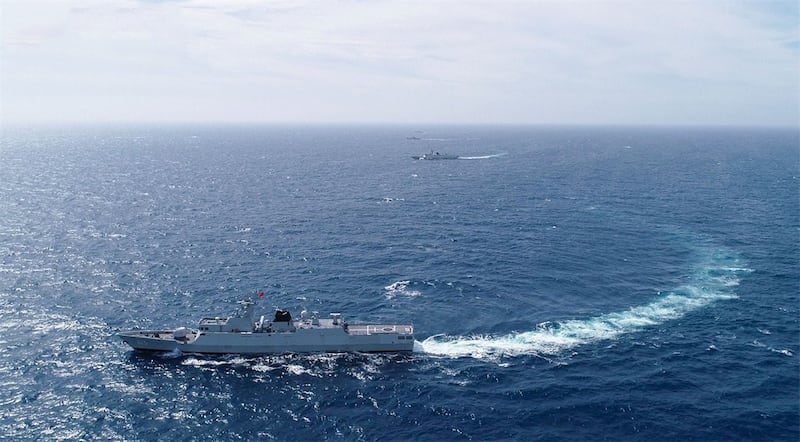China and Vietnam are holding two joint patrols this month in the Gulf of Tonkin despite conflicting interests in the wider South China Sea.
A naval joint patrol was held last week from Nov. 21-23 and a patrol between the two coast guards is being held from Monday until Dec. 2, media from both countries reported.
Two vessels from each side have taken part in each event.
The main purpose of the joint activities is “to carry forward the traditional friendship and deepen mutual trust between the two countries, as well as further promote mutual understanding between the two militaries,” they said.
The Gulf of Tonkin, called Beibu Gulf in Chinese and Vinh Bac Bo in Vietnamese, is the shared water between northern Vietnam and China’s Guangxi Zhuang Autonomous Region, as well as Leizhou Peninsula and Hainan Island.
Hanoi and Beijing formally agreed on the demarcation of the gulf in 2005. The two countries have since been holding regular joint patrols of the navies and coast guard forces.
According to media reports, vessels from the two countries “conducted patrols along the gulf’s division line, exchanging information about hydrology, meteorology, sea and air conditions in the patrol area.”
"After the joint patrol, the two sides carried out joint search and rescue drills as well as communication drills," Xinhua news agency reported.
The ongoing coast guard joint patrol also focuses on "monitoring and control of fishing vessels from both countries" in order to reinforce the law against illegal, unreported, and unregulated (IUU) fishing, according to Vietnam's People's Army Daily.
Lack of mutual trust?
“These are routine joint patrols between the two militaries, besides some other similar activities along their land border,” said Nguyen Ngoc Truong, a former Vietnamese ambassador turned political analyst.
“But the gulf is clearly demarcated so this is an easy routine. I don’t think it says much about the mutual trust,” he added. “The South China Sea is a totally different matter.”

Vietnam and China are among six parties holding overlapping territorial claims in the South China Sea and Hanoi rejects the so-called ‘nine-dash line’ that Beijing uses to claim historical rights over the entire sea.
The two countries have also been embroiled in bitter disputes over natural resources in the South China Sea.
“China has been sending ships to harass Vietnam’s oil and gas exploration in its own exclusive economic zone, such as at the Vanguard Bank,” said analyst Nguyen Ngoc Truong.
“You can see how it is very difficult to build mutual trust.”
Hanoi has been careful in balancing its relations with the world’s major powers China and the United States but in September upgraded its partnership with the U.S. to the comprehensive strategic level, on par with China.
Edited by Mike Firn and Taejun Kang.
